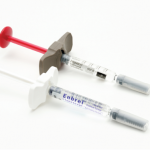Among those who completed the trial, the frequency of adverse events was similar, researchers found. But in the glucocorticoid group, 16.5% of patients opted to stop therapy because of adverse events, compared with just 9.3% in the standard therapy group.
“Although these results should be tested with other biologic therapies,” Dr. Caporali said, “the high dropout rate for adverse events in the intensive group should be carefully considered in the risk–benefit ratio.”
ad goes here:advert-1
ADVERTISEMENT
SCROLL TO CONTINUE
Thomas R. Collins is a freelance writer living in South Florida.
References
ad goes here:advert-2
ADVERTISEMENT
SCROLL TO CONTINUE
- Barral C, Hajage D, Fautrel B, et al. Tool and threshold predicting a successful biological DMARDs tapering in patients with RA remission determination (abstract OP0018). Annual European Congress of Rheumatology. 2017 Jun 14. Madrid, Spain.
- Pope J, Rampakakis E, Grant E, et al. DMARD withdrawal in RA patients achieving therapeutic response with certolizumab pegol cobined with DMARDs: Interim results from a Canadian observational randomized study (abstract OP0019). Annual European Congress of Rheumatology. 2017 Jun 14. Madrid, Spain.
- Caporali R, Montecucco C, Bartoloni E, et al. Induction of remission and maintenance in early, aggressive rheumatoid arthritis using adalimumab in combination with methotrexate with or without short-term high-dose glucocorticoids: Results of a Phase IV multicenter, randomized, double blind study (abstract OP0015). Annual European Congress of Rheumatology. 2017 Jun 14. Madrid, Spain.

